Preface
Goal: Thorough /etc/fstab/ example
Table of Content
-
Preface: Table of Content
-
2: Using UUID
Overview
There are three parts of mount point on fstab, that we are going to talk about.
-
Initial: clean install: root and swap
-
Common: shared partition, and windows data partititon
-
Custom: access to other OS
-
OpenSUSE: access to: Fedora, Debian, KaOSx.
-
Fedora: access to: openSUSE, Debian, KaOSx.
-
Debian: access to: openSUSE, Fedora, KaOSx.
-
KaOSx: access to: openSUSE, Fedora, Debian.
-
Device Name and UUID
There are two approach of setting mount point
-
Using device path: e.g /dev/sda9
-
Using UUID: e.g c114d95e-bc0a-4b41-a2db-abd21aa9850f
List Block Device
We are going to use lsblk, to have a listing of our beloved block device .
% lsblk
NAME MAJ:MIN RM SIZE RO TYPE MOUNTPOINT
sda 8:0 0 465.8G 0 disk
├─sda1 8:1 0 131.9G 0 part /media/System
├─sda2 8:2 0 1K 0 part
├─sda5 8:5 0 57.7G 0 part /media/Works
├─sda6 8:6 0 66.4G 0 part /media/Docs
├─sda7 8:7 0 999M 0 part /media/Boot
├─sda8 8:8 0 9.9G 0 part /media/Fun
├─sda9 8:9 0 49.1G 0 part /media/openSUSE
├─sda10 8:10 0 49.1G 0 part /media/KaOSx
├─sda11 8:11 0 49.1G 0 part /
├─sda12 8:12 0 49.1G 0 part /media/Debian
└─sda13 8:13 0 2.5G 0 part [SWAP]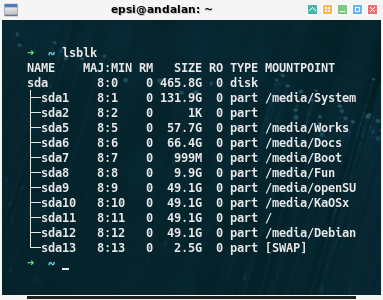
Dotfiles Document
Config is available at:
1: Using Device Path
Since openSUSE with BTRFS is complex, I’m going to start with Fedora.
Before we use UUID, I start with device name. It is easier to read /dev/sda9 than read c114d95e-bc0a-4b41-a2db-abd21aa9850f.
Manual Page
This is where to get help.
$ man fstab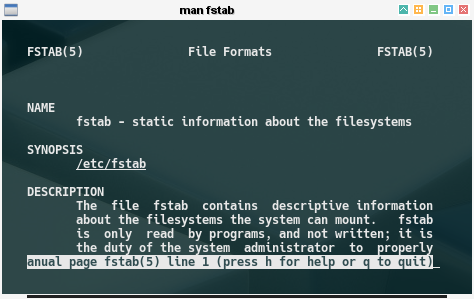
Initial
Depend on your installation, your minimum fstab contain only this two entry.
# Fedora
/dev/sda11 / ext4 defaults 1 1
/dev/sda13 none swap swap 0 0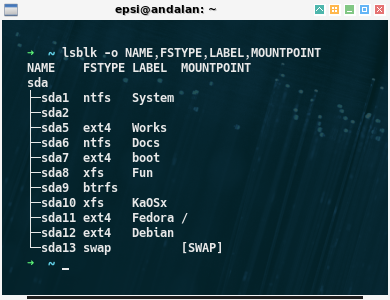
Common
Add shared Partition. And this Windows is common to all linux.
### Common
/dev/sda1 /media/System ntfs-3g defaults,noauto,locale=en_US.UTF-8 0 0
/dev/sda6 /media/Docs ntfs-3g defaults,locale=en_US.UTF-8 0 0
/dev/sda5 /media/Works ext4 defaults,users,exec 0 2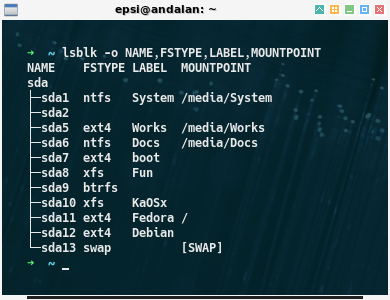
Custom Access
How about the rest.
### Other Distribution
/dev/sda10 /media/KaOSx xfs defaults,noauto,users 0 0
/dev/sda12 /media/Debian ext4 defaults,noauto,users 0 0
### OpenSUSE
/dev/sda9 /media/openSUSE btrfs defaults,noauto,users 0 0
/dev/sda7 /media/Boot ext4 defaults,noauto,user,errors=remount-ro 0 0
/dev/sda8 /media/Fun xfs defaults,noauto,users 0 0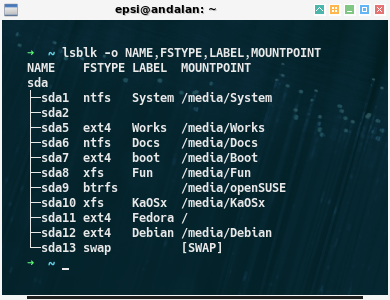
And the result of lsblk -o is:
% lsblk -o NAME,FSTYPE,LABEL,MOUNTPOINT
NAME FSTYPE LABEL MOUNTPOINT
sda
├─sda1 ntfs System /media/System
├─sda2
├─sda5 ext4 Works /media/Works
├─sda6 ntfs Docs /media/Docs
├─sda7 ext4 boot /media/Boot
├─sda8 xfs Fun /media/Fun
├─sda9 btrfs /media/openSUSE
├─sda10 xfs KaOSx /media/KaOSx
├─sda11 ext4 Fedora /
├─sda12 ext4 Debian /media/Debian
└─sda13 swap [SWAP]Complete
And finally this is all.
# Fedora
# /etc/fstab
/dev/sda11 / ext4 defaults 1 1
/dev/sda13 none swap swap 0 0
### Common
/dev/sda1 /media/System ntfs-3g defaults,noauto,locale=en_US.UTF-8 0 0
/dev/sda6 /media/Docs ntfs-3g defaults,locale=en_US.UTF-8 0 0
/dev/sda5 /media/Works ext4 defaults,users,exec 0 2
### Other Distribution
/dev/sda10 /media/KaOSx xfs defaults,noauto,users 0 0
/dev/sda12 /media/Debian ext4 defaults,noauto,users 0 0
### OpenSUSE
/dev/sda9 /media/openSUSE btrfs defaults,noauto,users 0 0
/dev/sda7 /media/Boot ext4 defaults,noauto,user,errors=remount-ro 0 0
/dev/sda8 /media/Fun xfs defaults,noauto,users 0 0Additional entry
However, there are entry on the fourth field, like this one:
defaults,noauto,users You can read what it mean in mount manual page.
$ man 8 mount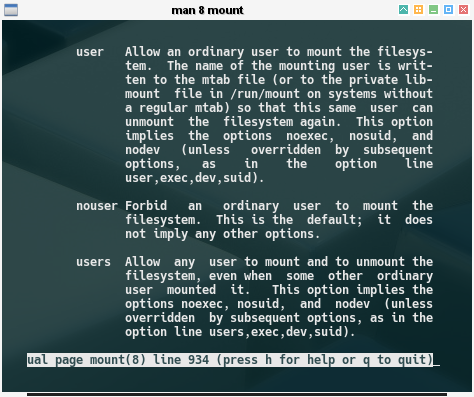
Shared partition
I have my shared partition at /media/Works
Except for working partition, I want to make my script executable.
defaults,users,execMy working partition is going to be automatically mounted, at boot time. Because I put my samba (network neighbourhood) directory over there.
2: Using UUID
Now we are going to convert each device name such as /dev/sda9, to UUID such as c114d95e-bc0a-4b41-a2db-abd21aa9850f. First, consider what the map in your PC.
% tree /dev/disk/by-uuid
/dev/disk/by-uuid
├── 0095473d-ae63-4722-8350-f5716e5df333 -> ../../sda8
├── 01CF01333AD2FF20 -> ../../sda6
├── 23342d48-c3be-402c-b049-b3e9ddeafbc0 -> ../../sda7
├── 4190d7a9-fb03-4d19-864f-7d04f89c3be0 -> ../../sda12
├── 442456A824569CAC -> ../../sda1
├── 50f93bc6-711d-4f70-84cf-09748e653543 -> ../../sda10
├── 954a9b1e-c8c0-4f38-8877-fa891c79c9ae -> ../../sda5
├── 9c76fb33-fa7a-46af-b2bb-f82d385b81b6 -> ../../sda11
├── b623e30b-c7a5-4f99-a250-45372da4c5b4 -> ../../sda13
└── c114d95e-bc0a-4b41-a2db-abd21aa9850f -> ../../sda9
0 directories, 10 files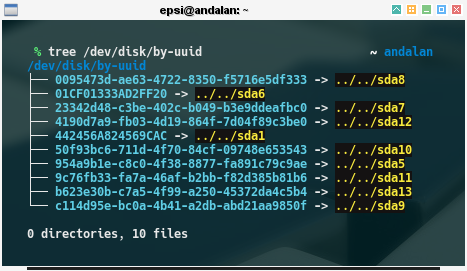
Fedora
Still, I’m going to start with Fedora. Clean Install without additional mount point.
Depend on your installation, your minimum fstab contain only this two entries.
UUID=9c76fb33-fa7a-46af-b2bb-f82d385b81b6 / ext4 defaults 1 1
UUID=b623e30b-c7a5-4f99-a250-45372da4c5b4 none swap swap 0 0In a complete fashion, this would be:
# Fedora
#
# /etc/fstab
# Created by anaconda on Fri Jul 21 22:03:59 2017
#
# Accessible filesystems, by reference, are maintained under '/dev/disk'
# See man pages fstab(5), findfs(8), mount(8) and/or blkid(8) for more info
#
# / was on /dev/sda11 during installation
UUID=9c76fb33-fa7a-46af-b2bb-f82d385b81b6 / ext4 defaults 1 1
# swap was on /dev/sda13 during installation
UUID=b623e30b-c7a5-4f99-a250-45372da4c5b4 none swap swap 0 0mtab
Consider cross check the result with /etc/mtab. Note that normally swap would not be shown.
% cat /etc/mtab | grep sda | column -t
/dev/sda11 / ext4 rw,relatime,data=ordered 0 0
Debian
In a same way, consider have a look at ext4 in Debian.
# / was on /dev/sda12 during installation
UUID=4190d7a9-fb03-4d19-864f-7d04f89c3be0 / ext4 errors=remount-ro 0 1
# swap was on /dev/sda13 during installation
UUID=b623e30b-c7a5-4f99-a250-45372da4c5b4 none swap sw 0 0
/dev/sr0 /media/cdrom0 udf,iso9660 user,noauto 0 0KaOSx
And, also have a look at XFS in KaOSx.
# / was on /dev/sda10 during installation
UUID=50f93bc6-711d-4f70-84cf-09748e653543 / xfs defaults,noatime 0 1
# swap was on /dev/sda13 during installation
UUID=b623e30b-c7a5-4f99-a250-45372da4c5b4 swap swap defaults,noatime 0 0It is pretty much the same with XFS.
openSUSE
But very different with BTRFS in openSUSE.
# / was on /dev/sda9 during installation
UUID=23342d48-c3be-402c-b049-b3e9ddeafbc0 /boot ext4 errors=remount-ro 0 1
UUID=c114d95e-bc0a-4b41-a2db-abd21aa9850f / btrfs defaults 0 0
UUID=0095473d-ae63-4722-8350-f5716e5df333 /home xfs defaults 1 2
UUID=b623e30b-c7a5-4f99-a250-45372da4c5b4 swap swap defaults 0 0
UUID=c114d95e-bc0a-4b41-a2db-abd21aa9850f /boot/grub2/i386-pc btrfs subvol=@/boot/grub2/i386-pc 0 0
UUID=c114d95e-bc0a-4b41-a2db-abd21aa9850f /boot/grub2/x86_64-efi btrfs subvol=@/boot/grub2/x86_64-efi 0 0
UUID=c114d95e-bc0a-4b41-a2db-abd21aa9850f /opt btrfs subvol=@/opt 0 0
UUID=c114d95e-bc0a-4b41-a2db-abd21aa9850f /srv btrfs subvol=@/srv 0 0
UUID=c114d95e-bc0a-4b41-a2db-abd21aa9850f /tmp btrfs subvol=@/tmp 0 0
UUID=c114d95e-bc0a-4b41-a2db-abd21aa9850f /usr/local btrfs subvol=@/usr/local 0 0
UUID=c114d95e-bc0a-4b41-a2db-abd21aa9850f /var/cache btrfs subvol=@/var/cache 0 0
UUID=c114d95e-bc0a-4b41-a2db-abd21aa9850f /var/crash btrfs subvol=@/var/crash 0 0
UUID=c114d95e-bc0a-4b41-a2db-abd21aa9850f /var/lib/libvirt/images btrfs subvol=@/var/lib/libvirt/images 0 0
UUID=c114d95e-bc0a-4b41-a2db-abd21aa9850f /var/lib/machines btrfs subvol=@/var/lib/machines 0 0
UUID=c114d95e-bc0a-4b41-a2db-abd21aa9850f /var/lib/mailman btrfs subvol=@/var/lib/mailman 0 0
UUID=c114d95e-bc0a-4b41-a2db-abd21aa9850f /var/lib/mariadb btrfs subvol=@/var/lib/mariadb 0 0
UUID=c114d95e-bc0a-4b41-a2db-abd21aa9850f /var/lib/mysql btrfs subvol=@/var/lib/mysql 0 0
UUID=c114d95e-bc0a-4b41-a2db-abd21aa9850f /var/lib/named btrfs subvol=@/var/lib/named 0 0
UUID=c114d95e-bc0a-4b41-a2db-abd21aa9850f /var/lib/pgsql btrfs subvol=@/var/lib/pgsql 0 0
UUID=c114d95e-bc0a-4b41-a2db-abd21aa9850f /var/log btrfs subvol=@/var/log 0 0
UUID=c114d95e-bc0a-4b41-a2db-abd21aa9850f /var/opt btrfs subvol=@/var/opt 0 0
UUID=c114d95e-bc0a-4b41-a2db-abd21aa9850f /var/spool btrfs subvol=@/var/spool 0 0
UUID=c114d95e-bc0a-4b41-a2db-abd21aa9850f /var/tmp btrfs subvol=@/var/tmp 0 03: Common Mount Point
No matter what your distribution, You can just add this mount point to your fstab.
#Entry for /dev/sda1 (windows system):
UUID=442456A824569CAC /media/System ntfs-3g defaults,noauto,locale=en_US.UTF-8 0 0
#Entry for /dev/sda6 (windows data):
UUID=01CF01333AD2FF20 /media/Docs ntfs-3g defaults,locale=en_US.UTF-8 0 0
#Entry for /dev/sda5 (shared partition) :
UUID=954a9b1e-c8c0-4f38-8877-fa891c79c9ae /media/Works ext4 defaults,users,exec 0 2I mean for every fstab in my system (Fedora, openSUSE, Debian, KaOSx).
mtab
Consider cross check the result with /etc/mtab.

4: Custom Mount Point
Now mount point to access other distribution.
Fedora
Still, start with Fedora.
Access: openSUSE, Debian, KaOSx.
#Entry for /dev/sda10 :
#/dev/sda10 /media/KaOSx xfs defaults,noauto,users 0 0
UUID=50f93bc6-711d-4f70-84cf-09748e653543 /media/KaOSx xfs defaults,noauto,users 0 0
#Entry for /dev/sda12 :
UUID=4190d7a9-fb03-4d19-864f-7d04f89c3be0 /media/Debian ext4 defaults,noauto,users 0 0
#Entry for /dev/sda9 (openSUSE root):
UUID=c114d95e-bc0a-4b41-a2db-abd21aa9850f /media/openSUSE btrfs defaults,noauto,users 0 0
#Entry for /dev/sda7 (openSUSE boot):
UUID=23342d48-c3be-402c-b049-b3e9ddeafbc0 /media/Boot ext4 defaults,noauto,user,errors=remount-ro 0 0
#Entry for /dev/sda8 (openSUSE home):
UUID=0095473d-ae63-4722-8350-f5716e5df333 /media/Fun xfs defaults,noauto,users 0 0Have a look at the /etc/fstab config for Fedora:
mtab
Again, consider cross check the result with /etc/mtab.
% cat /etc/mtab | grep sda | column -t
/dev/sda11 / ext4 rw,relatime,data=ordered 0 0
/dev/sda5 /media/Works ext4 rw,nosuid,nodev,relatime,data=ordered 0 0
/dev/sda1 /media/System fuseblk rw,relatime,user_id=0,group_id=0,allow_other,blksize=4096 0 0
/dev/sda6 /media/Docs fuseblk rw,relatime,user_id=0,group_id=0,allow_other,blksize=4096 0 0
/dev/sda12 /media/Debian ext4 rw,nosuid,nodev,noexec,relatime,data=ordered 0 0
/dev/sda9 /media/openSUSE btrfs rw,nosuid,nodev,noexec,relatime,space_cache,subvolid=257,subvol=/@ 0 0
/dev/sda10 /media/KaOSx xfs rw,nosuid,nodev,noexec,relatime,attr2,inode64,noquota 0 0
/dev/sda7 /media/Boot ext4 rw,nosuid,nodev,noexec,relatime,errors=remount-ro,data=ordered 0 0
/dev/sda8 /media/Fun xfs rw,nosuid,nodev,noexec,relatime,attr2,inode64,noquota 0 0
Debian
In a same way, we can do the same thing again with Debian.
Access: Fedora, openSUSE, KaOSx.
#Entry for /dev/sda10 :
#/dev/sda10 /media/KaOSx xfs defaults,noauto,users 0 0
UUID=50f93bc6-711d-4f70-84cf-09748e653543 /media/KaOSx xfs defaults,noauto,users 0 0
#Entry for /dev/sda11 :
UUID=9c76fb33-fa7a-46af-b2bb-f82d385b81b6 /media/Fedora ext4 defaults,noauto,user,errors=remount-ro 0 0
#Entry for /dev/sda9 (openSUSE root):
UUID=c114d95e-bc0a-4b41-a2db-abd21aa9850f /media/openSUSE btrfs defaults,noauto,users 0 0
#Entry for /dev/sda7 (openSUSE boot):
UUID=23342d48-c3be-402c-b049-b3e9ddeafbc0 /media/Boot ext4 defaults,noauto,user,errors=remount-ro 0 0
#Entry for /dev/sda8 (openSUSE home):
UUID=0095473d-ae63-4722-8350-f5716e5df333 /media/Fun xfs defaults,noauto,users 0 0Have a look at the /etc/fstab config for Debian:
KaOSx
And so does KaOSx.
Access: Fedora, openSUSE, Debian.
#Entry for /dev/sda12 :
UUID=4190d7a9-fb03-4d19-864f-7d04f89c3be0 /media/Debian ext4 defaults,noauto,users 0 0
#Entry for /dev/sda11 :
UUID=9c76fb33-fa7a-46af-b2bb-f82d385b81b6 /media/Fedora ext4 defaults,noauto,user,errors=remount-ro 0 0
#Entry for /dev/sda9 (openSUSE root):
UUID=c114d95e-bc0a-4b41-a2db-abd21aa9850f /media/openSUSE btrfs defaults,noauto,users 0 0
#Entry for /dev/sda7 (openSUSE boot):
UUID=23342d48-c3be-402c-b049-b3e9ddeafbc0 /media/Boot ext4 defaults,noauto,user,errors=remount-ro 0 0
#Entry for /dev/sda8 (openSUSE home):
UUID=0095473d-ae63-4722-8350-f5716e5df333 /media/Fun xfs defaults,noauto,users 0 0Have a look at the /etc/fstab config for KaOSx:
openSUSE
And also does openSUSE.
Access: Fedora, Debian, KaOSx.
### Other Distribution
#Entry for /dev/sda10 :
#/dev/sda10 /media/KaOSx xfs defaults,noauto,users 0 0
UUID=50f93bc6-711d-4f70-84cf-09748e653543 /media/KaOSx xfs defaults,noauto,users 0 0
#Entry for /dev/sda11 :
UUID=9c76fb33-fa7a-46af-b2bb-f82d385b81b6 /media/Fedora ext4 defaults,noauto,user,errors=remount-ro 0 0
#Entry for /dev/sda12 :
UUID=4190d7a9-fb03-4d19-864f-7d04f89c3be0 /media/Debian ext4 defaults,noauto,users 0 0Have a look at the /etc/fstab config for openSUSE:
GParted
Again with GUI, to have better understanding.
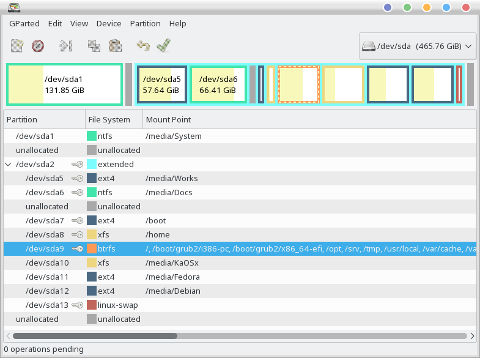
What’s Next?
Consider continue reading [ Multiboot: chroot ].